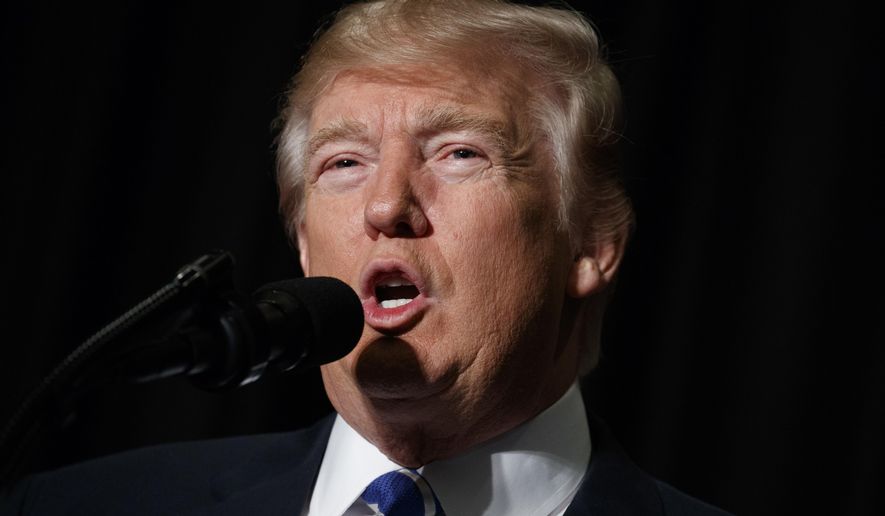President Trump’s Education Department can easily revoke mandates compelling colleges and universities to take due process rights away from students accused of sexual assault — but undoing practices institutionalized by the Obama administration and backed by feminist factions on campus will require greater effort.
Stuart Taylor Jr., a former non-resident fellow at the Brookings Institution, said incoming Education Secretary Betsy DeVos should repeal orders threatening to pull federal funds from universities that fail to adopt adjudication processes that increase the likelihood that male students accused of sexual misconduct will be found guilty.
“What they can and should do, very easily and very fast, is revoke all of the various orders that the Obama administration issued to colleges,” said Mr. Taylor, who co-wrote “The Campus Rape Frenzy” with K.C. Johnson. “These orders have been couched as guidance, and they don’t have the standing of regulations because they did not go through the necessary notice and comment rule-making process, so that means Trump and his people can make them disappear with the stroke of a pen.”
In response to what the Obama administration described as an epidemic of campus rape, the Education Department’s Office for Civil Rights in 2011 began issuing “Dear Colleague Letters” that invoked Title IX to force colleges to establish disciplinary procedures for resolving sexual assault allegations between students.
In one such letter, the Obama administration said colleges must “ensure that steps to accord any due process rights do not restrict or unnecessarily delay the protections by Title IX to the complainant.” As a result, campus tribunals rarely include due process protections such as the presumption of innocence, access to exculpatory evidence and the right to cross-examine one’s accuser.
Mr. Johnson, an American history professor at Brooklyn College, said the Obama administration brought into the mainstream a theory espoused by radical feminists that college campuses are hotbeds of sexual violence.
Feminists have long tried to prove that 20 percent to 25 percent of women will be sexually assaulted during their college years, he said, by using an overly broad definition of rape and reclassifying as victims women who do not believe their ambiguous encounters constituted assault.
“For a lot of faculty, it’s obvious that these guys are guilty,” Mr. Johnson said. “This is vindication of their scholarship that sees America as racist, sexist, classist and all the rest.”
He pointed to two rape hoaxes that nearly bookended Mr. Obama’s presidency — the 2006 case in which three Duke University lacrosse players were falsely accused of rape and the 2015 Rolling Stone article that recounted the false story of a female student who claimed she was raped by members of a University of Virginia fraternity. Mr. Johnson said students have become more zealous about rolling back due process protections for the accused.
“The students at Duke were really in some ways the heroes of the case,” he said. “They held back; they didn’t rush to judgment. The difference now is that the administrations and the faculties are still the same, but the shift has been in the student bodies, where, in the last four or five years, what we’ve seen from students nationally in polls and anecdotally at the campus level is they’re just as enthusiastic in terms of beating back rights as the faculty and the administrators were.”
Case in point: In response to the Rolling Stone article, the student government at the University of Virginia lobbied for a state law to make all rape trials secret.
“They’re responding to a fake rape claim, and there was no willingness to recognize that their assumptions were wrong,” Mr. Johnson said. “So that’s a big, big shift.”
Another difficulty facing any potential reform is the proliferation of Title IX coordinators and other staff who were hired by universities to comply with the Obama administration orders.
“One of the things that Obama did was, some of the regulatory guidance that Obama pushed for required colleges to hire Title IX officers and to assign them to these sexual assault allegations,” Mr. Johnson said. “There’s just been this proliferation of hiring around the country.”
He said the administrators will continue to enforce the Obama administration’s interpretation of Title IX unless more proactive measures are taken.
Some courts have intervened to protect accused students who did not receive fair hearings. But Mr. Johnson said this is a weak first line of defense, because the most substantial precedent for challenging university disciplinary procedures has to do with academic misconduct, in which courts have generally taken a hands-off approach.
“Depending on the circuit, the legal precedent on these cases often is set in campus discipline matters that involve plagiarism or academic misconduct,” he said. “And for very good reason, courts are reluctant to second-guess a professor’s judgment that this student cheated on an exam or something like that.”
E. Everett Bartlett, president of Stop Abusive and Violent Environments, recommended Congress take up legislation drafted by his organization to ensure the due process rights of accused students are not infringed.
The Campus Equality, Fairness, and Transparency Act would, among other things, require universities to implement disciplinary procedures containing due process protections for the accused, define which acts constitute sexual assault or harassment, and take measures to curb alcohol and drug use on campus. It would also encourage schools to refer accusations of sexual assault to criminal justice authorities.
Ultimately, Mr. Taylor said undoing the damage done by the Obama administration will take a group effort.
“There’s a huge task to be done that the Trump administration can’t really do by itself,” he said. “And that task demands the efforts of Congress, state legislatures, governors, parents, trustees, those academics on campus who respect due process — unfortunately, not many do anymore. It’s a huge task that will take many years.”
• Bradford Richardson can be reached at brichardson@washingtontimes.com.




Please read our comment policy before commenting.